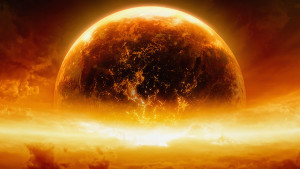A young mother discovered that her little boy had lied to her. Utterly shocked and desperate to correct his wayward behaviour, she sat him down and said to him, “Listen—you can’t lie to Mummy! If you do that again, a big tall man with red eyes and horns is going to come and take you away. He’ll make you work for 100 years in the coal mines just for telling one little lie!”
The look on the boy’s face told the mother that he was listening carefully. Encouraged that she was getting through to him, she said, “Now, you’ll never lie to Mummy again, will you?”
He thought for a moment and then blurted out, “No ma’am, I wouldn’t dare—’cause you tell them better than I do!”
The Bible is crystal clear about what will happen to those who seek forgiveness and choose faith in Christ. They’re given eternal life, which they’ll spend in the presence of Christ. “The Lord Himself will descend from heaven with a shout, with the voice of an archangel, and with the trumpet of God. And the dead in Christ will rise first. Then we who are alive and remain shall be caught up together with them in the clouds to meet the Lord in the air. And thus we shall always be with the Lord” (1 Thessalonians 4:16, 17, NKJV).*
What will happen to all the other people? Popular Christian literature says they’ll suffer eternal torment in the fires of hell. Knowing that 2000 years of tradition and supposition have accumulated since the Bible was completed, we need to ask whether it actually teaches that idea. It’s entirely possible that a pile of human assumptions has covered the simple biblical truth. Is it possible that stories have been passed from generation to generation without the all-important step of scriptural verification?
No such stories in the Bible
The truth is that the Bible has no lengthy, cruel descriptions of people being tortured.
“But,” you may ask, “doesn’t the Bible teach that the wicked are destined for fire?”
It does, in fact, teach something close to that. The fire, according to the Bible, is quite real: “Anyone not found written in the Book of Life was cast into the lake of fire” (Revelation 20:15).
Case closed, right?
According to some Christians, yes. But this statement is brief and doesn’t include much detail. All the Bible says is that the wicked—those whose names are not found in the Book of Life—will be cast into a lake of fire. That’s the essence of it. Search for yourself and see.
Suffice to say, the concept of fire for the wicked is very much present in the Bible. The question now is whether or not the entire biblical picture matches the stories we were told as children. Is God a cruel tyrant who tortures people eternally when they don’t agree with Him? Or is there more to what the Bible writers present as God’s final dealings with evil?
So far we’ve been able to determine that the Bible really does speak of fire for the wicked. But it also tells us that fire wasn’t meant for human beings. That’s right. It was not God’s original plan.
In fact, when Jesus described the people who will be lost in the end, He mentioned that hell was meant for the fallen angels: “Then He will also say to those on the left hand, ‘Depart from Me, you cursed, into the everlasting fire prepared for the devil and his angels’ ” (Matthew 25:41).
The ramifications of this statement are huge. Not one human being was ever supposed to end up in the fires of hell! God didn’t have us in mind when He came up with the scheme. Hell was meant for the fallen angels. We’ll end up there only if we persist in giving our loyalty to them. We’ll end up in hell only because we follow the devil there.
Like a harvest
Perhaps the clearest picture of how the fire will work was presented in a parable Jesus told that compares the end of the world to a harvest.
"Another parable He put forth to them, saying: ‘The kingdom of heaven is like a man who sowed good seed in his field; but while men slept, his enemy came and sowed tares among the wheat and went his way. But when the grain had sprouted and produced a crop, then the tares also appeared. So the servants of the owner came and said to him, “Sir, did you not sow good seed in your field? How then does it have tares?” He said to them, “An enemy has done this.” The servants said to him, “Do you want us then to go and gather them up?” But he said, “No, lest while you gather up the tares you also uproot the wheat with them. Let both grow together until the harvest, and at the time of harvest I will say to the reapers, ‘First gather together the tares and bind them in bundles to burn them, but gather the wheat into my barn’ ” "(Matthew 13:24–30).
There are a lot of lessons to be gleaned (what other word could you possibly use for a harvest story?) from this parable, not the least of which is that you and I haven’t been commissioned to separate the tares from the wheat. We aren’t capable of judging who is part of God’s harvest and who isn’t. But this story also provides us with an important description of how God intends to use fire to carry out the verdict of the final judgement. To prevent any misunderstanding, Jesus continued by giving us a detailed explanation of the story He’d told.
“He answered and said to them: ‘He who sows the good seed is the Son of Man. The field is the world, the good seeds are the sons of the kingdom, but the tares are the sons of the wicked one. The enemy who sowed them is the devil, the harvest is the end of the age, and the reapers are the angels."
“Therefore as the tares are gathered and burned in the fire, so it will be at the end of this age. The Son of Man will send out His angels, and they will gather out of His kingdom all things that offend, and those who practise lawlessness, and will cast them into the furnace of fire."
“There will be wailing and gnashing of teeth. Then the righteous will shine forth as the sun in the kingdom of their Father. He who has ears to hear, let him hear!’ ” (verses 37–43).
This means, of course, that nobody is currently suffering in the fires of hell. If you’ve been worried that a loved one is suffering, put your mind at ease: there is no knowledge in the grave, no suffering, no pain, no conscious existence of any kind. The fire won’t burn until after Jesus’ second coming— which makes sense, because final rewards won’t be given out until He returns.
I once believed that the wicked would be screaming in a place of torment forever, without end. But the Bible doesn’t teach anything of the sort. God doesn’t torture people. If they ultimately don’t want to be a part of His kingdom, He won’t allow them to exist indefinitely, sinking to lower and lower depths of depravity.
There’s a limit to the pain and suffering that a God of love will allow. He waits. He’s patient, hoping that more people will choose to accept His offer of salvation. He’s “longsuffering toward us, not willing that any should perish but that all should come to repentance” (2 Peter 3:9). But there’s a limit. He can’t wait forever. Sin must be abolished. Suffering must come to an end. And Christ must inherit the kingdom He won at Calvary.
Neverending fire?
There are some seldom-quoted passages of the Bible that tell us that the wicked will not be tormented eternally. They’ll be consumed like dry grass, burned up and reduced to ashes.
“ ‘Behold, the day is coming, burning like an oven, and all the proud, yes, all who do wickedly will be stubble. And the day which is coming shall burn them up,’ says the Lord of hosts, ‘that will leave them neither root nor branch. But to you who fear My name the Sun of Righteousness shall arise with healing in His wings; and you shall go out and grow fat like stall-fed calves. You shall trample the wicked, for they shall be ashes under the soles of your feet on the day that I do this,’ says the Lord of hosts” (Malachi 4:1–3).
“You shall make them as a fiery oven in the time of Your anger; the Lord shall swallow them up in His wrath, and the fire shall devour them. Their offspring You shall destroy from the earth, and their descendants from among the sons of men” (Psalm 21:9, 10).
“The wicked shall perish; and the enemies of the Lord, like the splendour of the meadows, shall vanish. Into smoke they shall vanish away” (Psalm 37:20).
“The Lord preserves all who love Him, but all the wicked He will destroy” (Psalm 145:20).





